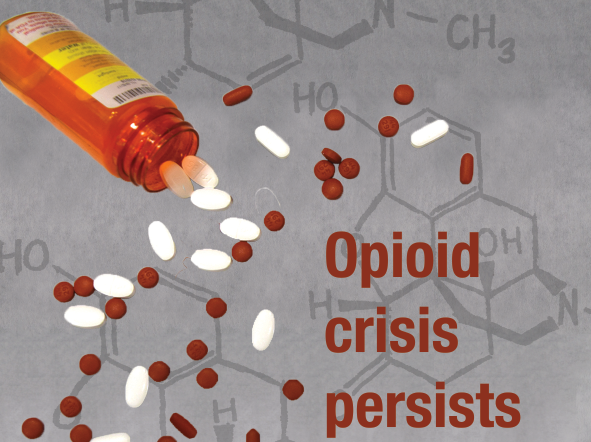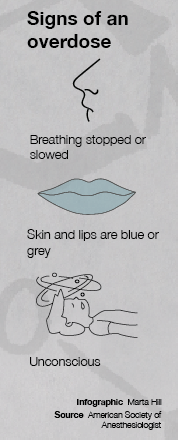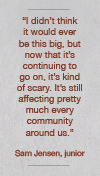
Opioid crisis persists
Prescription drug addiction, overdoses impact Park
Junior Sara Anderson said she felt uncomfortable using prescribed opioid painkillers after under- going a major chest surgery because of the possibility of becoming addicted.
“I was prescribed narcotics to take home and use for a month and then general stuff like Advil,” Anderson said. “I used them at the beginning, but then I went off them a few weeks early, because I’ve heard stories of people getting addicted to painkillers after surgery. I didn’t want to do that.”
What are opioids?
According to drug counselor Kjirsten Hanson, opioids are extremely addictive painkillers such as oxycodone, hydrocodone and percocet.
“They’re highly addictive — very, very highly addictive,” Hanson said. “It (helps) calm the central nervous system. That’s where you get where the person stops breathing because it slows that down to try and alleviate some of the pain.”
Hanson said opioid overdoses cause harm because they directly affect the brain.
“They act on a very specific part of the brain in terms of kind of easing pain, and they also suppress some of the systems that are in place,” Hanson said.
Amy Busch, pharmacy manager at Park Nicollet Methodist Hospital, said there are five different schedules, or categories, of controlled narcotics that correspond to how addictive a given drug is.
Busch said prescribed opioids fall between Schedule II and Schedule V. Illegal opioids, such as heroin, are considered Schedule I because of their severe effects.
“(Heroin is) in the (opioid) family, but that is an illicit drug. There’s different schedules of controlled narcotics,” Busch said. “A lot of patients that get addicted to opioids through legit prescriptions, so through real legitimate medicine, when they run out of that and they can’t get that, they’re tur
ning to heroin.”
According to junior Sam Jensen, the opioid crisis remains an alarming problem affecting both individual cities and the country as a whole.
“When I first heard about it, I didn’t think it would ever be this big, but now that it’s continuing to go on it’s kind of scary,” Jensen said. “It’s still affecting pretty much every community around us and in the country almost, so it’s a big deal.”
Busch said many teenagers are introduced to an opioid addiction by experimenting with opioids prescribed to someone they know.
“Mostly they are getting them out of medicine cabinets either at their home or at their friends’ parents’ homes,” Busch said. “That’s why

it’s just really important if you are prescribed something and you don’t end up using it all, don’t let it sit in your medicine cabinet. It is a danger out there. It really is a dangerous thing in your home.”
According to Hanson, local libraries provide space for people to throw away any unused prescription
medications.
“In Ridgedale Library, Brookdale Library (and) Roseville Library, there’s places where you can take in any kinds of (medications) in your
house, and no questions asked, nothing, you just put it in,” Hanson said.
Issue affects community
Freshman Elizabeth Hodges said she has seen the impact of opioid addiction in her everyday life.
“I know some people who have been affected by the opioid crisis. They’ve just ended up in situations where they needed those medicines or painkillers and (then) they just got started abusing the medicine,” Hodges said.
According to Busch, naloxone (Narcan) is a drug that reverses the effects of an overdose.
St. Louis Park Fire Department community outreach coordinator Nancy Schmelzle said since this past summer, Narcan has been available for city firefighters to administer when there’s an overdose.
“Generally those people are not breathing, so if they’re not breathing, of course we start CPR. Then beginning late this summer we also
started carrying Narcan,” Schmelzle said. “We start with a small amount and give them the nasal Narcan and then continue to administer CPR if needed.”
 Schmelzle said although Narcan has the ability to save people during an overdose, addiction and replication of opioids remain a significant concern.
Schmelzle said although Narcan has the ability to save people during an overdose, addiction and replication of opioids remain a significant concern.
“The bottom line is we don’t want these calls, so there needs to be more done about the crisis in general, none of which we have the power to do,” Schmelzle said. “If they don’t go through proper treatment and solve the problem, the likelihood of us seeing them again is pretty great.”
Jeremiah Gardner, manager of Hazelden Betty Ford Foundation, said opioids can impact anyone.
“Substance use disorders affect every kind of person, every socio-economic status, every race. Nobody is immune to the effects of substance use,” Gardner said. “Not everybody gets addicted, but a significant minority do, so it’s a risk for all of us when we try substances.”
According to Hodges, opioid abuse not only affects the user, but also affects the people around them.
“It’s just really sad to see the effect it has on their life because it can destroy them financially, destroy their relationships with family and friends,” Hodges said.
Senior Kenya Brooks, who knew someone who struggled with opioid addiction, said addiction impacts more people than just the addict.
“They’re homeless. They don’t keep a job. They’re using state pensions and SSI instead of bettering themselves or surviving off of it they spend the whole entire thing on drugs like opioids,” Brooks said. “A lot of times at this age group, we’re so quick to jump into things without knowing the effects it will have on our body.”


